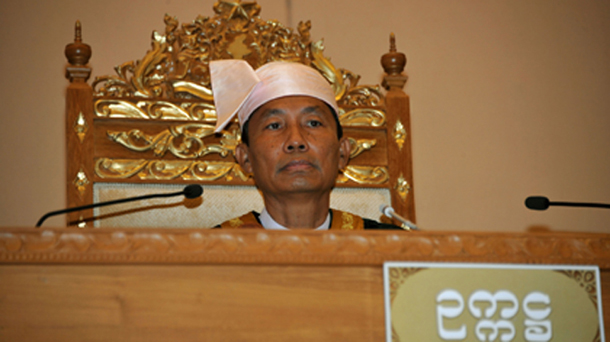RANGOON — Burma’s Parliament is considering how Constitutional amendments could protect the rights of ethnic minorities and promote a more federal system, lawmakers say.
Parliamentary speaker Shwe Mann hosted a meeting on Tuesday with other lawmakers, including ethnic minority lawmakers, to discuss options for moving toward a system that gives states and divisions more power over their own affairs.
According to a statement about the meeting published on Parliament’s official website, the group considered possible Constitutional amendments to safeguard the rights of ethnic minorities, who comprise about 40 percent of Burma’s 60 million or so population.
Lawmakers said the suggested amendments would protect the right of ethnic minorities to practice their own religions and host traditional ceremonies, and to teach ethnic literature and languages. Other suggested amendments would give ethnic minorities equal rights to health care and employment, and another revision would call for ethnic representatives to lead state-level governments, rather than former generals from the majority Burman ethnicity.
Two possible options were discussed on Tuesday for working toward a federal system: The Constitution could be completely rewritten, or it could be amended. Several lawmakers at the meeting said the second option would likely be easier.
In either case, Shwe Mann, a high-ranking member of the former regime who has expressed ambitions for becoming the country’s next president, said more protections were needed for ethnic minority rights.
“The 2008 Constitution gave rights to the people. But if the people say those rights have not been respected, it’s the duty of Union ministers to work on that,” the parliamentary speaker said, as quoted by the Daily Eleven newspaper.
“If the ethnic minority people and the people haven’t gotten their rights yet, how can they be satisfied?” he added. “It will be difficult to achieve national reconciliation. There should be a Constitution that is respected by everyone.”
Burma began a process of political reform two years ago, after nearly half a century of military rule and decades of civil war between ethnic minority groups and the Burman-dominated national government. President Thein Sein’s administration has signed ceasefire deals with 10 of the country’s 11 major rebel groups, but clashes continue in some areas and ethnic minorities say their demands for political dialogue have not been met.
Burma’s government recognizes eight major ethnic groups in the country and dozens of subgroups, for a total of 135 groups. The former regime said allowing a federal system or autonomy would encourage secessionist impulses.
Burma’s Parliament has established a 109-member committee to consider amendments to the Constitution that could allow opposition leader Aung San Suu Kyi to run for president and provide greater protections for ethnic minorities. The committee is dominated by the ruling party, with 50 members from the Union Solidarity and Development Party (USDP) and 25 representatives from the military, plus seven members from Suu Kyi’s National League for Democracy (NLD) and five from ethnic-based parties.
Any amendment to the Constitution would require approval from at least 75 percent of Parliament. That poses a challenge for opposition parties because the USDP and military control more than 80 percent of seats.
“It’s better to write a new one,” Hkun Htun Oo, an ethnic Shan leader, told The Irrawaddy on Wednesday. “It might take a long time to amend it.”
He said the current Constitution was not based on the people’s wishes, as it was drafted without prior consultation with the NLD and other opposition groups.
“Let all people participate in writing a new Constitution,” he said. “If all people can’t participate, how can we solve conflicts in the country?”
Tun Ohn, an Upper House lawmaker from the All Mon Region Democracy Party (AMDP), is also calling for a fresh draft.
“I believe it’s better to write a new Constitution, as I have found there are no equal rights for ethnic minority groups in the current Constitution,” he said.
Ba Shein, an ethnic Arakanese lawyer and lawmaker who represents the Rakhine Nationalities Development Party in the Lower House, said, “They need to share power in order to make this a fair system, as there are eight main ethnic groups in the country.”
Mi Myint Than, another AMDP lawmaker, said ethnic lawmakers planned to call another meeting with Shwe Mann to discuss the issue of federalism.
“We will talk to him about our feelings on the issue of federalism for the country,” he said. “We have listened to what he has to say. We want him to listen to our voice.”

















